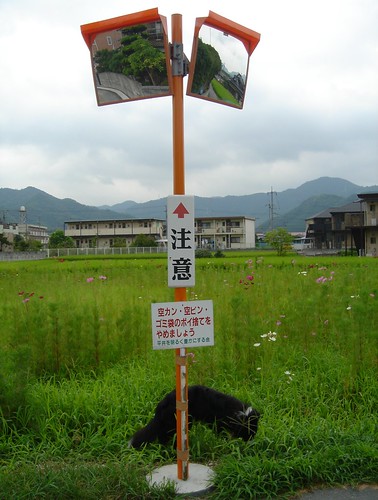Wednesday, August 17, 2005
Mirror Mirror
I thought I had given up on mirrors, but what with the flowers and the dog...The flower "cosmos" is growing in the field behind. Cosmos is used to rejuvenate rice fields when they lie fallow. It has the same effect as planting clover in pastoral grassland.
As mentioned elsewhere (Heine, Takemoto, Moskalenko, Lasaleta, & Henrich, 2008), the Japanese do not exhibit the well known "objective self awareness" (Duval & Wicklund, 1972) "pro-social" (more moral) effect in front of a mirror. That is to say that while North Americans and Britons behave in a more honest, more moral, more helpful way when they are placed in front of a mirror, according to our research (Heine, Takemoto, Moskalenko, Lasaleta, & Henrich, 2008), the Japanese do not.
At the same time however, the Japanese worship in front of mirrors, and view the mirror as a symbol of god (not as of vanity). When worshipping I believe that they also see themselves in the mind of the god, that is to say engage in moral "reflection" (doesn't everyone do that when they are praying?) So, when I first started doing the experiments, I expect the Japanese to have a greater "objective self awareness pro-social effect," and was surprised to find that they did not have one at all. We conclude that they are always simulating and thus effectively standing in front of a mirror. They do not need to see themselves reflected to know what they must look like.
I do not think that it is difficult to do this. Mead (the famous Western psychologist that argued that self-awareness is essentially linguistic) argued that it is only actors that can simulate the eye of the other and live as if before a mirror. I disagree. I think that women are encouraged to do so, as argued by feminist theory. I believe that anyone might well have a heightened visual/imaginary self awareness. In the West mirrors are linked with wicked witches and visual self awareness with being a woman or vain. Here in Japan visual self awareness is related to having an upstanding moral conscience. More recent neurological research has shown that this capacity is present in all humans, through the use of mirror neurons.
Even though seeing oneself in a mirror may not be required to increase Japanese self-reflection, perhaps the sight of an empty (in the sense of non-self reflecting) mirror may encourage the observer to imagine that which the mirror is not reflecting - the self. So in that sense perhaps non-self-reflecing mirrors may have a pro-social effect on Japanese. And perhaps that is why we see this encouragement to be more pro-social, and not litter, attached to a mirror? This is something that I would like to investigate experimentally.
Duval, S., & Wicklund, R. A. (1972). A theory of objective self awareness. Oxford, England: Academic Press. Heine, S. J., Takemoto, T., Moskalenko, S., Lasaleta, J., & Henrich, J. (2008). Mirrors in the head: Cultural variation in objective self-awareness. Personality and Social Psychology Bulletin, 34(7), 879–887. Retrieved from http://www2.psych.ubc.ca/~henrich/Website/Papers/Mirrors-pspb4%5B1%5D.pdf
As mentioned elsewhere (Heine, Takemoto, Moskalenko, Lasaleta, & Henrich, 2008), the Japanese do not exhibit the well known "objective self awareness" (Duval & Wicklund, 1972) "pro-social" (more moral) effect in front of a mirror. That is to say that while North Americans and Britons behave in a more honest, more moral, more helpful way when they are placed in front of a mirror, according to our research (Heine, Takemoto, Moskalenko, Lasaleta, & Henrich, 2008), the Japanese do not.
At the same time however, the Japanese worship in front of mirrors, and view the mirror as a symbol of god (not as of vanity). When worshipping I believe that they also see themselves in the mind of the god, that is to say engage in moral "reflection" (doesn't everyone do that when they are praying?) So, when I first started doing the experiments, I expect the Japanese to have a greater "objective self awareness pro-social effect," and was surprised to find that they did not have one at all. We conclude that they are always simulating and thus effectively standing in front of a mirror. They do not need to see themselves reflected to know what they must look like.
I do not think that it is difficult to do this. Mead (the famous Western psychologist that argued that self-awareness is essentially linguistic) argued that it is only actors that can simulate the eye of the other and live as if before a mirror. I disagree. I think that women are encouraged to do so, as argued by feminist theory. I believe that anyone might well have a heightened visual/imaginary self awareness. In the West mirrors are linked with wicked witches and visual self awareness with being a woman or vain. Here in Japan visual self awareness is related to having an upstanding moral conscience. More recent neurological research has shown that this capacity is present in all humans, through the use of mirror neurons.
Even though seeing oneself in a mirror may not be required to increase Japanese self-reflection, perhaps the sight of an empty (in the sense of non-self reflecting) mirror may encourage the observer to imagine that which the mirror is not reflecting - the self. So in that sense perhaps non-self-reflecing mirrors may have a pro-social effect on Japanese. And perhaps that is why we see this encouragement to be more pro-social, and not litter, attached to a mirror? This is something that I would like to investigate experimentally.
Duval, S., & Wicklund, R. A. (1972). A theory of objective self awareness. Oxford, England: Academic Press. Heine, S. J., Takemoto, T., Moskalenko, S., Lasaleta, J., & Henrich, J. (2008). Mirrors in the head: Cultural variation in objective self-awareness. Personality and Social Psychology Bulletin, 34(7), 879–887. Retrieved from http://www2.psych.ubc.ca/~henrich/Website/Papers/Mirrors-pspb4%5B1%5D.pdf
Labels: japan, japanese culture, nihonbunka, 日本文化
This blog represents the opinions of the author, Timothy Takemoto, and not the opinions of his employer.

